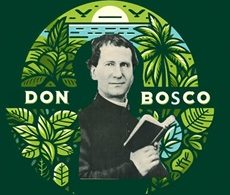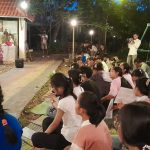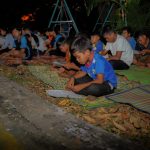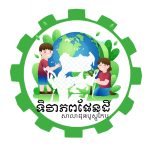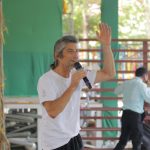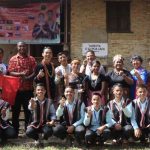
Our Don Bosco Technical School and Children Fund Educational Project of Kep Province, has been since 2011 the space of activities and initiatives for the care and protection of the environment, inspired by the fact that our school is located inside the Kep National Park. We believe that this concern for the environment expressed in practical actions such as the care of a jungle-garden, the request of support for solar energy and the campaigns of recycling, is important for a school where children, youth and teachers find a connection to nature, becoming natural promoters for the care of the Common Home. As members of the Don Bosco Green Alliance, Don Bosco Kep thrives to become a leader in the region as a model of sustainability for the environment, while being a qualified center for education, especially in the TVET project.
There are six big challenges in this program:
The use of green technologies to save energy and to become sustainable with the installation of solar panels on our roofs since 2012. Thanks to some donors, we have been able to maintain it for 12 years, despite the need for regular renewal of the panels. The work with solar panels opened the opportunity for our students and teachers of the electrical department to be trained in this field of solar energy that is taking already a lead in Cambodia, since the government is now very much interested in promoting solar energy production in a tropical country where we have the rays of the Brother Sun all around the year.
Tasks:
- Managers of each department have to develop a plan to save energy at the department level. Please consider the installation of KW Solar Power Station mandatorily either at the top of department building or in open field. This will enable the institute to have more power supply.
- Managers of the departments agree in the implementation of conventional light sources such as bulbs and tube lights, halogen and mercury street/campus lights. These steps will not only save the money but make the institute self sustainable.
- Energy audits will be made mandatory for every department at the end of every semester.
- Save Energy will be the motto of every day’s work in each department. Every department will purchase only energy star compliant computers and equipment. If an energy star is unavailable, purchase the most energy-efficient model available in the market.
- Save Energy TIPS:
- 1. Activate power management features on your computer and monitor so that it will go into a low power “sleep” mode when you are not working on it.
- 2. Turn off your monitor when you leave your Table.
- 3. Activate power management features on your laser printer.
- 4. Whenever possible, shut down rather than logging off.
- 5. Turn off unnecessary lights and use daylight instead.
- 6. Avoid the use of decorative lighting.
- 7. Use LED or compact fluorescent bulbs.
- 8. Keep lights off in conference rooms, classrooms, lecture halls when they are not in use.
- 9. Use the fans only when they are needed.
- 10. Unplug appliances not plugged into power strips (like TVs, Refrigerators, ACs, tea/coffee pots, printers, faxes, and chargers etc.)
The second challenge is the management of wastewater and the collection of rainwater. Both elements are also important since a school produces a lot of wastewater. In 2012 we were worried that the wastewater of Don Bosco Kep could reach the sea without a proper treatment. Once more, thanks to some donors and the knowledge of some volunteers, we could create a wastewater treatment plant that also generated an authentic pond with fish. At the same time, we have built some other ponds to collect rainwater to create native environments inside the school, where fish, reptiles, birds and other creatures can find their habitats, while students and teachers can enjoy it all the time.
Wastewater Management/ Rainwater harvesting Every department has to work in the direction of wastewater management particularly in student’s hostels. Water flow restrictors on bathroom faucets and showers, low water flow toilets and automatic urinal flushers should be used to cut down campus water use. Every department will take all necessary measures to implement waste water management /rain water harvesting.
The third challenge has to do with the management of waste like plastic and other materials. The school kitchen and the canteens have joined the waste food process for the feeding of animals and the production of compost. Plastic, on its part, is a very difficult topic in Cambodia, where we are waiting for more strict official control to curb the over usage of it and its evident disposal everywhere around the country, creating a negative impact for all environments on waters and lands. The proposal to control the usage of plastic inside the school is difficult, because the national context is stronger than a sole initiative. In this case, we have decided to collect and sell plastic as much as possible, creating collecting places and dealing with recycling groups of Kep Province.
The fourth challenge, in connection with our TVET programs, has to do with the management of what we call industrial waste. A technical school produces, as an industrial company, although less, waste from workshops such as methyl, obsolete machinery, chemical substances like paint and many other special waste. This is very important for a technical school to create a process of waste management of those articles, because it educates the young students in situations that they will be very sensitive when they join their future jobs in the country. Creating policies in this area can be effective, but their implementation comes from the awareness of teachers, who are the ones leading the workshops. It is not easy however, because some teachers can consider that the industrial waste is not actually a problem.
The fifth challenge is the creation of a green library. It means the access to written and audiovisual material that is available for teachers and students and that is also closely connected to the TVET curricula. Use more readout material in soft form. Reduce the hard readout material. Use more e-mail for officially communicating the information needed, online reading etc. Save paper.
Lastly, as the sixth challenge, we have the contribution to the school jungle-garden. The use of the word “jungle” means the connection of the school to the region where the school is located, privileged the planting of native species. Knowing the region and its native environment is very important because it will link the green campus to its own grand environment. Students and teachers must know the natural forests around and the type of species present on it. In our Don Bosco Kep school it has been easy, because our students and teachers come from the region and from rural areas. Being indigenous, they know the native plants and appreciate them as part of their natural living houses. I think that an institution in the middle of a city could find it more difficult, because modern cities are seen, in general, as a separation from nature. The dualism city-wild is very much present in the Western mentality, although we can see now the growing of the green cities concept. A city with many green parks and streets does not necessarily mean the presence of native species. Urban developers tend to include trees they like for their flowers and forms rather than consulting the ancient flora of the territory where it is the city now.
The creation of jungle-gardens with native species also attracts native fauna and it preserves natural cycles that have been interrupted by the huge constructions of buildings in the metropolis. Of course, many urban people are terrorized by the fact of wild fauna near their living spaces. In this sense, once more, we need campaigns of education to know and appreciate wildlife and the ways to live along with them. In these 12 years of our Don Bosco Kep Brother Sun Jungle-Garden, we are proud to be the natural environment of rather small creatures such as snakes. I mention them, because snakes are associated with danger. But in our traditional unwritten green policies to protect our jungle-garden, we have registered the snake species and studied them for years, getting to know some facts such as that not all snakes are dangerous to humans. To those species we know that could pose a risk to the students because they are poisonous, we hunt them and bring them to the deep of the Kep National Forest where we live too.
Documenting animals and plants is a fascinating activity that became a norm for our students and teachers, while contemplating the beauty of birds, reptiles, insects, fish and plants. The jungle-garden grows, creating beautiful forest environments inside the school, where we can demonstrate that humans and nature can live together in harmony. The indigenous traditions in this regard have been important and inspiring. We have discovered that taking care of a jungle is something without end and that, most importantly, the forest takes care of us as well with the provision of food, health and beauty.
